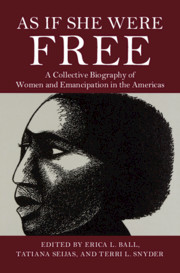Book contents
- As If She Were Free
- As If She Were Free
- Copyright page
- Dedication
- Contents
- Figures
- Contributors
- Elizabeth Catlett and the Form of Emancipation
- Acknowledgments
- Introduction
- Part I Claiming Emancipation during the Rise of New World Slavery
- Part II Experiencing Freedom during Slavery’s Expansion
- Part III Envisaging Emancipation during Second Slavery
- Part IV Enacting Emancipation in the Aftermath of Slavery
- 20 María Remedios del Valle, Nineteenth-Century Argentina
- 21 Lumina Sophie, Nineteenth-Century Martinique
- 22 Emma Lane Coger, Nineteenth-Century Illinois, Iowa, and Missouri (US)
- 23 Laura E. Davis Titus, Nineteenth-Century Norfolk, Virginia (US)
- 24 Carrie Williams Clifford, Nineteenth- and Early Twentieth-Century Ohio (US)
- Bibliography
- Index
22 - Emma Lane Coger, Nineteenth-Century Illinois, Iowa, and Missouri (US)
from Part IV - Enacting Emancipation in the Aftermath of Slavery
Published online by Cambridge University Press: 24 September 2020
- As If She Were Free
- As If She Were Free
- Copyright page
- Dedication
- Contents
- Figures
- Contributors
- Elizabeth Catlett and the Form of Emancipation
- Acknowledgments
- Introduction
- Part I Claiming Emancipation during the Rise of New World Slavery
- Part II Experiencing Freedom during Slavery’s Expansion
- Part III Envisaging Emancipation during Second Slavery
- Part IV Enacting Emancipation in the Aftermath of Slavery
- 20 María Remedios del Valle, Nineteenth-Century Argentina
- 21 Lumina Sophie, Nineteenth-Century Martinique
- 22 Emma Lane Coger, Nineteenth-Century Illinois, Iowa, and Missouri (US)
- 23 Laura E. Davis Titus, Nineteenth-Century Norfolk, Virginia (US)
- 24 Carrie Williams Clifford, Nineteenth- and Early Twentieth-Century Ohio (US)
- Bibliography
- Index
Summary
Emma Coger, the plaintiff in Coger v. Northwestern Union Packet Company (1873), was a feisty young schoolteacher who physically resisted steamboat officers when they refused to treat her as a lady because of her color. Emma was not the first woman of African descent to sue a common carrier over race discrimination in the United States, but her suit was unusual for being planned, and for being brought in cooperation with organized men. One of the earliest civil rights lawsuits brought under the Fourteenth Amendment led the Iowa Supreme Court to outlaw race segregation on common carriers. In the 1870s, when she orchestrated her challenge to the discrimination practiced by a steamboat company, she did so with the support both African American crew members as well as with that of the Prince Hall Masons, a US organization deeply engaged in civil rights work. Her case went all the way to the Iowa Supreme Court, and it is still used cited in legal decisions today.
- Type
- Chapter
- Information
- As If She Were FreeA Collective Biography of Women and Emancipation in the Americas, pp. 393 - 410Publisher: Cambridge University PressPrint publication year: 2020

